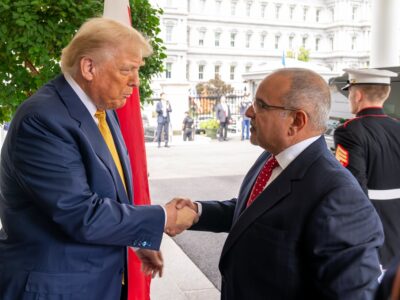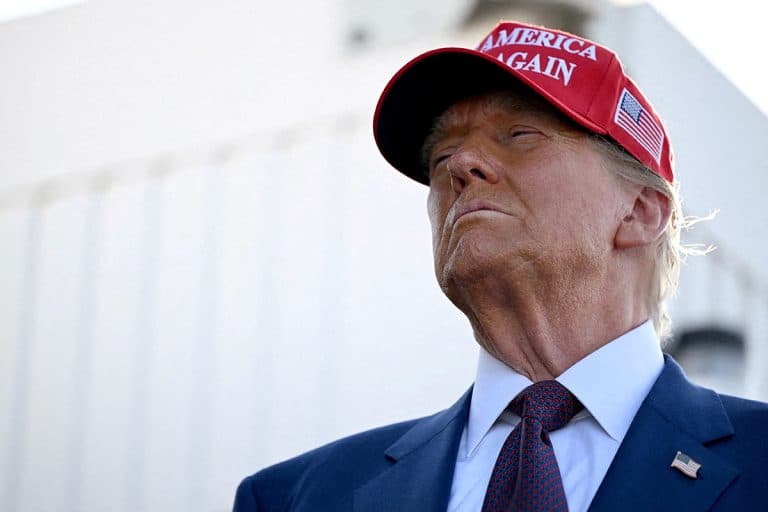President-elect Donald Trump’s threat to impose sweeping tariffs on allies and rivals represents a more aggressive version of his previous trade strategy – one that experts say could fundamentally alter global commerce as technological shifts already transform manufacturing economics.
Trump has threatened 25 per cent tariffs on Canadian and Mexican imports when he takes office in January, alongside a proposed 10 per cent duty on Chinese goods that could rise to 60 per cent. More dramatically, he warned BRICS nations considering alternatives to the US dollar that they could face 100 per cent tariffs.
The strategy appears calculated to pressure allies first, a tactic that brought Canadian Prime Minister Justin Trudeau to Trump’s Mar-a-Lago estate earlier this month for unscheduled talks.
Allies in the crosshairs
“Trump is a trade hawk in general so he will go after anyone that he believes is trying to impose unfavourable terms of trade on the United States. Anyone. Including and sometimes even starting with his own strategic allies,” Nicolas Michelon, CEO of Asia Intelligence Advisory, told Arabian Business.
This matches Trump’s first-term playbook.
“The first trade-related executive order that Trump signed when he first stepped into the White House was to increase tariffs on his own allies: Canada, Mexico, and the European Union, extra tariffs on aluminium and steel,” he added.
Beyond tariffs
Beyond tariffs, fundamental shifts in manufacturing economics could prove more disruptive than trade policy, according to former Trump trade advisor Barry Bennett.
“The rules of global trade, at least on our part, were designed to give us access to cheap labour,” Bennett told Arabian Business.
“As innovation and automation have dominated manufacturing this last decade, this cost of labour is no longer the driving force that it once was. In fact, it’s becoming marginal.”
This technological transformation particularly threatens China’s manufacturing base. “This automation is actually China’s enemy, not the United States,” he said, pointing to emerging US capabilities that challenge traditional cost advantages.
“For Trump, in 2024, America First means something very different than it did in 2016,” Abishur Prakash, founder of The Geopolitical Business Inc., told Arabian Business.
“During his first term, from trade to security, Trump disrupted the globe, but because he was new to politics and the global architecture was relatively strong, America First could only go so far.”

The strategy now extends beyond traditional trade measures.
“Gone are the days of mining in Africa then shipping to China for processing and selling to us out of the Chinese market whenever they feel like selling and at whatever price they feel like selling… that’s not sustainable for us and that can’t and won’t go on,” Bennett added.
Adrian Shatku, CEO of UNIFI Capital Group, sees Trump targeting “strategic sectors such as rare earth minerals, green energy technologies, and advanced electronics, where China’s dominance poses critical risks.”
Economic impact
The measures could return US import duties to 1930s levels. Trump’s previous trade war saw tariffs imposed on over $550 billion of Chinese imports, with Beijing retaliating on $185 billion of US goods.
His threat of 200 per cent tariffs on vehicles crossing the U.S.-Mexico border could particularly impact Asian manufacturers using Mexico as a production base. Mexico accounted for 78-83 per cent of its exports to the U.S. market in 2023, according to trade data, with total trade value between the two nations exceeding $745 billion last year.
The proposed measures appear to contradict the US-Mexico-Canada Agreement (USMCA), which Trump signed in 2020. The agreement, maintaining largely duty-free trade, requires renegotiation or withdrawal in 2026.
The China challenge
The strategy comes at a sensitive time for China, which faces property sector challenges, debt concerns, and weakened domestic demand. Chinese officials warn against trade confrontation, with embassy spokesperson Liu Pengyu stating that “No one will win a trade war or a tariff war.”
Yet experts say viewing Trump solely as anti-China misses the broader transformation underway.
“He’s actually someone who’s not afraid of hitting his allies first… his latest message on X was very interesting, the fact that he threatened existing BRICS and candidate BRICS economies with tariffs in case they were trying to get away from the US dollar,” Michelon noted.

The combination of tariffs and technological change could force a major reorganisation of global supply chains.
“Look at the Koreans, they make all their cars here, even Honda, everyone who used to make their cars in Asia and ship them to the United States now makes cars in the United States because the cost of shipping is far higher than any advantage the cost of labour might provide,” Bennett said.
What’s next?
As Trump prepares to take office, his economic agenda signals potential changes extending far beyond his first term’s disruptions. The strategy faces significant challenges, from legal constraints to economic headwinds and resistance from trading partners.
Whether this approach succeeds remains uncertain, but experts agree the international trading system faces unprecedented change.
“If we can make cellphones in Austin, Texas at the same cost as we can in China and not have to ship them across the ocean, that’s a huge competitive advantage,” Bennett said.









